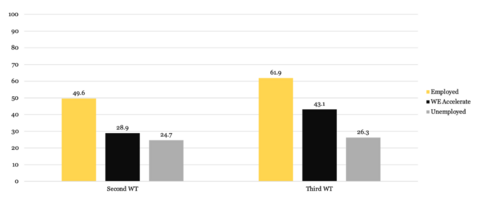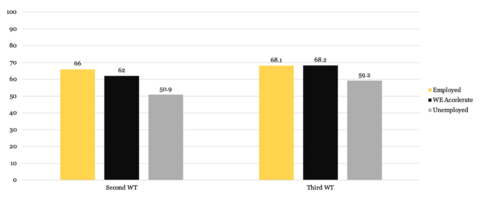Award-winning WE Accelerate program delivers results for students
By: Matthew King (he/him)
Work-Learn Institute research shows increase in students’ teamwork and critical thinking after taking part in the program.
Waterloo Experience (WE) Accelerate aims to help vulnerable first work term co-op students build skills to enhance employment for subsequent work terms – and according to research, it has achieved that goal. Students who participated in WE Accelerate were able to find jobs that better fit their skills and were happier with the pay. Three years after the pilot offering, this and other results are highlighted in a WE Accelerate study by Work-Learn Institute (WxL) and funded by Higher Education Quality Council of Ontario (HEQCO) skills consortium.
The study, Reversing Un(der)employment with Skills Development in the WE Accelerate Program, focused on the initial three cohorts of first work term students beginning with the pilot participants in spring 2021. It compared outcomes with their peers, both those employed and unemployed that term.
After participating in the program, WE Accelerate participants reported a 13 per cent increase in confidence in their teamwork skills and a 12 per cent increase in their critical thinking skills. These increases also helped set students up for subsequent work terms, which exhibit similarly positive results.
More bang for their buck
Overall, students who were successful at finding a co-op work term from the outset (i.e., those employed), earn more than their peers, including those in WE Accelerate and those unemployed. However, more WE Accelerate participants were likely to earn above their reference range than the unemployed cohort, especially in their third work term.
Above reference wage percentages

In their second work term, 49.6 per cent of students who were employed in their first work term received above their reference wage, followed by WE Accelerate students at 28.9 per cent of the time followed by those unemployed in their first work term at 24.7 per cent. In their third work term, the gap between WE Accelerate students at 43.1 per cent and unemployed students at 26.3 per cent increased sizeably.
Researchers sometimes refer to unemployment as a scar, because it leaves a lasting imprint on people as they move through the labour market. Our study showed that the WE Accelerate program is taking that unemployment scar and reducing it in half.
“It helped students get jobs earlier than expected, and it helped them get jobs that pay above what you would expect for their level of experience,” says Drewery.
On average, compared to non-participants, more WE Accelerate participants reported high pay satisfaction and that their jobs fit their skills and academic training.
The benefits become clear
The differences between the cohorts continues to emerge when it comes to timing of employment. Participants in WE Accelerate were employed earlier in their second work term than non-participants without previous work experience. Sixty-eight per cent of WE Accelerate program participants got matched to their preferred job by the third match cycle, compared to only 56.5 per cent of non-participants without previous work experience.
“It's a reflection that students are taking something valuable out [of WE Accelerate] and putting that into their application packages, and employers say, ‘I would rather have that student,’” says Drewery.
The trend continued when researchers looked at jobs tagged as senior-level positions. Sixty-two per cent of WE Accelerate participants were employed in a senior job versus 50.9 per cent of those who remained unemployed in their first work term. Students continued to see benefits into their third work term where WE Accelerate participants were the most successful at landing a senior-level position with 68.2 per cent of participants doing so.
Tagged senior percentages

In their second work term, 66 per cent of of students who were employed in their first work term worked in a senior-level position, followed by WE Accelerate students at 62 per cent. In their third work term, WE Accelerate students actually took the lead 0.1 percentage point ahead of their employed peers at 68.2 per cent, with the unemployed group reaching a senior level position 59.2 per cent of the time.
“An 11 per cent point gap is sizeable and that continues to ripple into the third work term,” says Drewery. "It's not just the term following to whether they participated in WE Accelerate, but it actually has an effect that lasts into their third work term. A year after they participated, there's still a benefit there.”
The effects of WE Accelerate are clear. Students leave the program more confident in the skills they have developed and it gives students valuable experience that resonates with employers in their subsequent work terms.
Where WE Accelerate really seems to shine is in reducing the unemployment scar’s effects on quality, especially in terms of helping students to get jobs earlier, helping them to get jobs that are more senior and improving the likelihood that they're going to earn more than you would expect based on their faculty and level of experience.